calsfoundation@cals.org
Wayne Raney (1921–1993)
Wayne Raney was an American country singer and harmonica player best known for his hit song “Why Don’t You Haul Off and Love Me.” Raney, along with fellow Arkansan Lonnie Glosson, played a major role in making the harmonica a popular instrument through their musical performances as well as through their mail-order harmonica business.
Wayne Raney was born on August 17, 1921, on a farm near Wolf Bayou (Cleburne County), the youngest of five children of William Franklin (Frank) Raney and Bonnie Davis Raney. Due to a foot deformity, he could not do heavy labor. Instead, he pursued an interest in music, learning to play harmonica at an early age. He was drawn to the harmonica after hearing a street performer play. At the age of thirteen, he hitchhiked to Eagle Pass, Texas, to record transcription records for radio station XEPN, of which he had been a longtime listener. In 1936, he met fellow Arkansan Lonnie Glosson, a hero of Raney’s who would become his longtime musical associate. The pair found work at radio station KARK in Little Rock (Pulaski County) in 1938 and later worked for WCKY out of Cincinnati, Ohio, and played on syndicated radio. They also established a harmonica mail-order business that became enormously successful; they sold millions of harmonicas and played a major role in turning the harmonica into a widely popular instrument. Raney married Loys Southerland from Drasco (Cleburne County) in 1941; they had three children—Wanda, Zyndall, and Norma.
In the years after World War II, Raney played with the Delmore Brothers, releasing several records with them on the King label between 1946 and 1952, including the Delmores’ hit “Blues Stay Away from Me” (which he co-wrote with the Delmores), as well as releasing solo work. His first two singles, “Lost John Boogie” and “Jack and Jill Boogie,” both reached the Top 15 on the U.S. country charts. His 1949 single “Why Don’t You Haul Off and Love Me,” produced by Hot Springs (Garland County) native Henry Glover (who also produced “Blues Stay Away from Me”), was a number-one country hit and also appeared in the Top 40 of the pop charts. Raney co-wrote “Why Don’t You Haul Off and Love Me” with Glosson. Raney also recorded novelty songs such as “Pardon My Whiskers” and “I Love My Little Yo Yo.”
Raney played at the Grand Ole Opry in 1949. That year, he also toured briefly with “Lefty” Frizzell and also worked on the California Hayride and the WWVA Jamboree. Late in the 1950s, he worked as a disc jockey, record producer, and label owner (starting Rimrock Records, a bluegrass-oriented label), as well as experimenting with rock and roll, as with his Decca Records version of “Shake Baby Shake.” In 1958, the King label collected many of his singles on the Songs of the Hills record. In the late 1950s, he wrote the Christian revival song “We Need a Whole Lot More of Jesus (And a Lot Less Rock and Roll),” which has been covered by numerous artists in a variety of styles, among them the Greenbriar Boys and Linda Ronstadt. He recorded country music into the early 1960s, including for his own label, and ceased the mail-order harmonica business in 1961.
After returning to Arkansas, he recorded a gospel album titled Don’t Try to Be What You Ain’t in 1963 for Starday Records. Eventually, he went into semi-retirement, running his own chicken farm and performing only occasionally in the late 1960s and 1970s. He appeared sporadically on Hee Haw in the 1970s. He was diagnosed with a form of muscular dystrophy in 1974 and lost his voice in the 1980s and ceased performing. In 1990, he published his autobiography, Life Has Not Been a Bed of Roses.
Raney died of cancer at Batesville (Independence County) on January 23, 1993, and is buried in Cleburne County at Pleasant Ridge Cemetery. He was posthumously inducted into the Country Music Disc Jockey Hall of Fame and the Western Swing Society Hall of Fame in 1994, and the George D. Hay Country Music Hall of Fame in 2000. He received the Ozark Pioneer Music Award in 1999.
For additional information:
Barger, Carl J. Cleburne County and Its People. 2 vols. Bloomington, IN: AuthorHouse, 2008.
Kingsbury, Paul, ed. The Encyclopedia of Country Music. New York: Oxford University Press, 1998.
Larkin, Colin. The Encyclopedia of Popular Music. Washington DC: Grove’s Dictionaries, 1998.
Manheim, James. “Wayne Raney” Allmusic.com. http://www.allmusic.com/cg/amg.dll?p=amg&sql=11:j9fixqtgldte~T1 (accessed March 1, 2022).
C. L. Bledsoe
Ghoti magazine
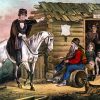 Arts, Culture, and Entertainment
Arts, Culture, and Entertainment World War II through the Faubus Era, 1941 through 1967
World War II through the Faubus Era, 1941 through 1967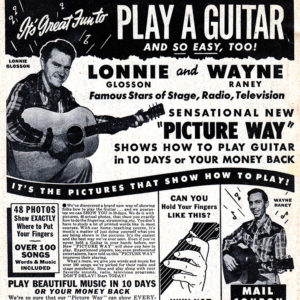 Glosson and Raney Ad
Glosson and Raney Ad  Meg-O-Harp
Meg-O-Harp 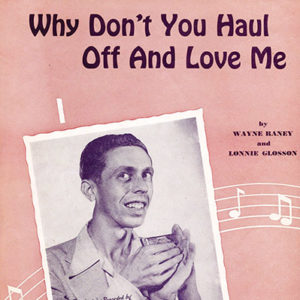 Wayne Raney Sheet Music
Wayne Raney Sheet Music 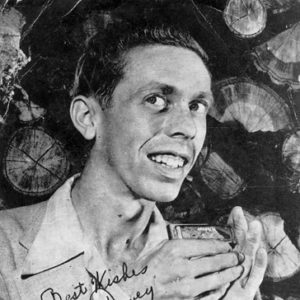 Wayne Raney
Wayne Raney 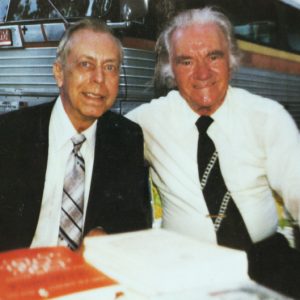 Wayne Raney and Lonnie Glosson
Wayne Raney and Lonnie Glosson 




From newspaper article “Life Off the Road” by Andy Banham (circa 1980s):
“How he made it may be the most amazing thing, but maybe not The days in the mid-thirties were ripe for the road and success.
My parents didnt encourage me or discourage me, said Wayne, remembering the day he left home some forty-five years ago. Things were so hard on the farm then that they were for anything that would better the family. And he took off down the dirt roads of rural Arkansas with his harmonica
The first man to put a dance beat to a country harmonica, the man who might stand with Bob Wills as a pioneer of western swing, Wayne didn’t write labor songs like Guthrie, or fightin songs like Acuff or Rodgers. He wrote about things back home, the Bootleg Boogie, girls left behind, old fashioned matrimony, plain old blues and, as the son of a preacher, a number of tunes with a low gospel edge.
Raneys songs are filled with humor, lines about Mama, mountains, courtin, cryin, and little children. There is a simple side of mountain living reflected in many which wouldnt sell today, but at one time were as popular as syrup in a tin Log Cabin.
Though the songs are rarely heard any longer, the style crept in and still pervades the country world every time an entertainer makes his harmonica cry, laugh or sigh. There is a little bit of Wayne Raney there.”
In 1958, Dad formed the Raney Family Gospel Trio along with my brother Zyndall (15) and me (16). We started with songs that were written by my dad, like Over the Rolling Sea and We Need a Whole Lot More of Jesus, and A Lot Less Rock & Roll. Other original gospel songs were recorded later, all on the Rimrock label.